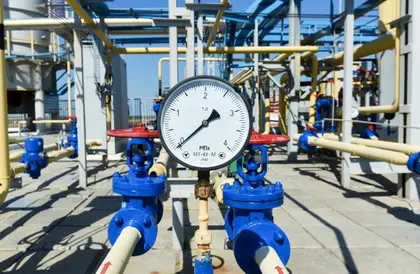In retaliation for coming up on the losing end of a Stockholm arbitration court ruling that will cost Russia’s state-controlled Gazprom $2.56 billion, the Kremlin indefinitely shut off natural gas supplies to Ukraine on March 1.
Ukraine, consequently, faces shortages for the rest of the winter.
JOIN US ON TELEGRAM
Follow our coverage of the war on the @Kyivpost_official.
But, eventually, all might work in Ukraine’s favor as energy experts expect the Russian energy monopoly to eventually pay its Ukrainian counterpart, Naftogaz. Moreover, Ukraine will try to win the public relations war by convincing the European Union that Gazprom is an unreliable partner, and that the EU should stop the Ukraine-bypass Nord Stream 2 pipeline under construction between Russia and Germany under the Baltic Sea.
- Find the most up-to-date war in ukraine update in the Kyiv Post's daily news items for today.
- Access the latest Ukraine news coverage for today.
Read more: Naftogaz wins $2.6 billion from Gazprom in Stockholm court
After a two-year break, triggered by Russia’s war, Russian gas supplies to Ukraine were set to resume on March 1. The Stockholm court, in fact, ordered Naftogaz to buy 5 billion cubic meters of gas annually until the end of a current contract in December 2019.
Alexander Medvedev, the deputy chairman of Gazprom, said on March 1 that his company returned prepayment to Ukraine.
Naftogaz views the cutoff as a breach of contract and violation of the court ruling.
The stoppage forced Ukraine to reduce its gas usage amid heavy snow and sub-freezing temperatures and urgently seek additional supply from other sources.
Speaking in parliament on March 2, Minister of Energy Ihor Nasalyk recommended that schools and universities will close until March 6 as Ukraine had to restrict its gas consumption. Heat generating companies temporarily switched to mazut, a low-quality fuel oil. He reported Ukraine needs to save 15-20 million cubic meters of gas a day.
Timothy Ash, a London-based analyst, doesn’t see the cutoff as critical for Ukraine since the heating season is almost over. Naftogaz will have to revert to European importers, which will be costlier. In his opinion, the consequences maybe worse for Moscow.
“It is likely to further the incentive of Europe to diversify energy supplies away from Russia, which is increasingly seen as a threat to the West on so many fronts,” he wrote.
Naftogaz CEO Andriy Kobolev said in an interview with Channel 5 that, by refusing to supply gas to Ukraine, Gazprom lost its right to apply the contract’s “take-or-pay” rule, which stipulates buyers have to pay for the full amount of gas whether it was physically delivered or not. He added that, in four years of importing gas, from European importers his company had never failed to receive gas it had paid for. It should be a warning sign for the European Union, he said.
Gazprom is soon to be one of the main suppliers of gas to Europe as the construction of two pipelines, Nord Stream 2 and TurkStream, is going at full speed and due to completion in 2019.
President Petro Poroshenko called the move “a demonstration of Russian aggressive disrespect to the established laws” and ordered Foreign Minister Pavlo Klimkin to organize trilateral talks with the European Commission.
Currently, Ukraine doubts whether Gazprom will fulfill its legal obligations at all.
“If Gazprom doesn’t pay this money [$2.56 billion], Naftogaz has to arrest its assets <…> including those which are part of Nord Stream 2,” he said at the meeting of the National Security and Defense Council on Mar. 1.
He threatened new lawsuits. “If Gazprom doesn’t change its mind and doesn’t fulfill the arbitration’s order, we will use all legal instruments according to the New York Convention on enforcement of foreign arbitral awards. The international law is on Ukraine’s side as well as in other conflicts with Russia,” Poroshenko said.
Leonid Bershidsky, a Bloomberg news service columnist, wrote that fears of Russia using energy as a political weapon are greatly exaggerated as European regulators have brought more competition to the energy market and forced Russia to drop its “take or pay” clause, requiring customers to buy specified amounts of gas or pay for it anyway.
“The upshot is that Naftogaz owes Gazprom $2 billion for failing to honor the “take or pay” clause; it also must resume buying gas from Russia this year at a rate of 5 billion cubic meters annually and pay for 80 percent of that even if it doesn’t,” Bershidsky wrote on March 2. “For its part, Gazprom owes Naftogaz $4.6 billion in unpaid transit fees. On a net basis, this is a huge victory for Ukraine, an extra year of transit revenues and some 7 percent of Gazprom’s European export revenues for 2017.”
And Bershidsky wrote: “As for the weaponization of energy deals, one needs look no further than Exxon Mobil’s decision to abandon its joint ventures with Russia’s state-owned oil company Rosneft after U.S. sanctions paralyzed a major offshore drilling venture in the Arctic. Unlike Russia, beaten into submission by European regulators and courts, the U.S. has plenty of power to extend its punitive policies into the energy realm.”
You can also highlight the text and press Ctrl + Enter




